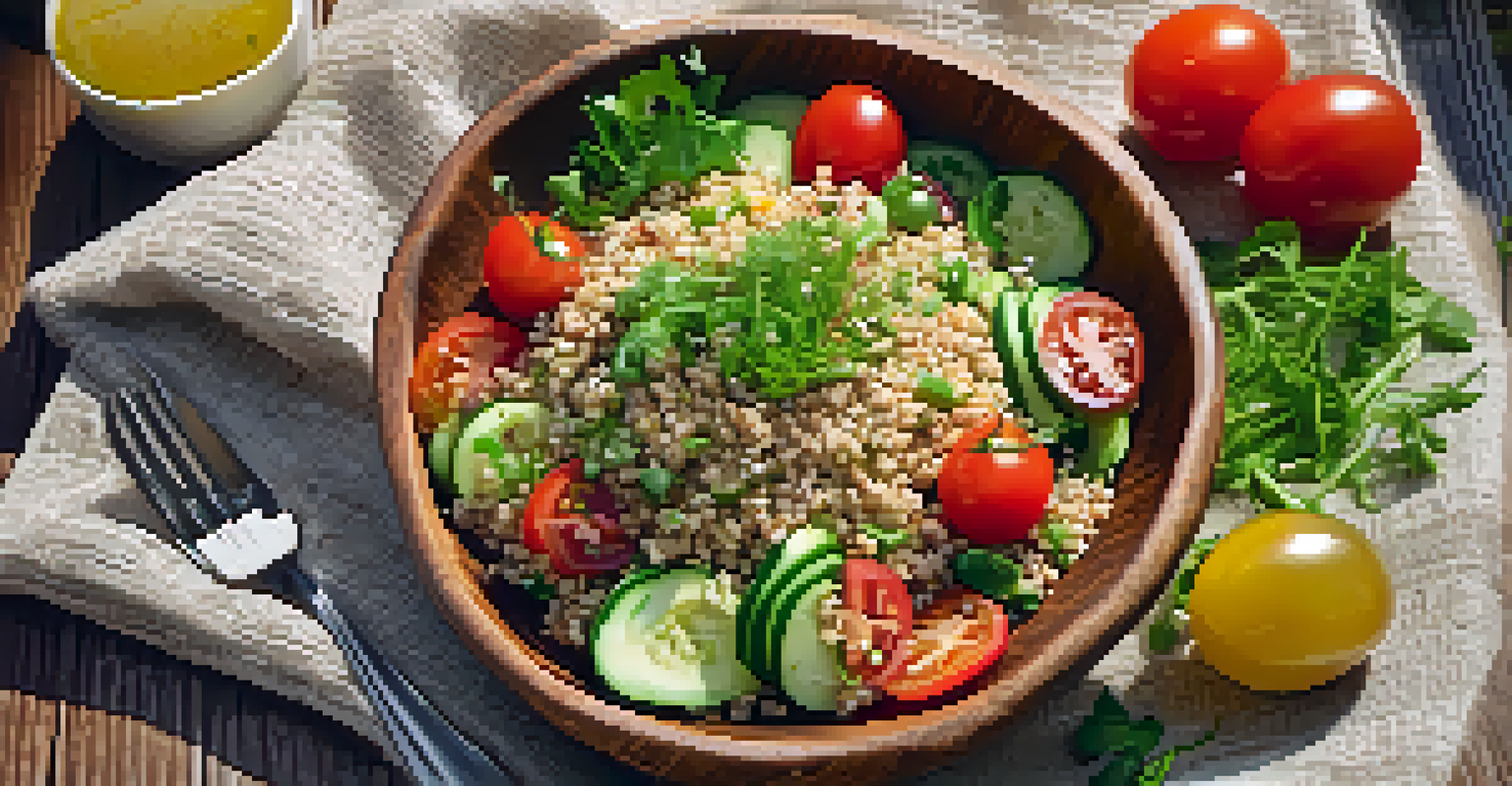Identifying Certified Organic Ingredients for Vegetarian Meals

Understanding Certified Organic Ingredients
Certified organic ingredients are those grown without synthetic pesticides, herbicides, or fertilizers. This means that these ingredients are cultivated in ways that promote ecological balance and biodiversity. When you choose organic, you're not just making a healthy choice for yourself but also supporting sustainable farming practices.
Organic farming is a way of farming that aims to produce food without synthetic chemicals, promoting a healthier ecosystem.
In many countries, organic certification is regulated by government bodies that set strict guidelines for what can be labeled as organic. For example, in the United States, the USDA oversees organic certification to ensure that farmers adhere to these standards. This certification not only assures you of the quality but also of the ethical practices behind the ingredients.
By understanding what certified organic means, you can better navigate grocery store aisles and farmers' markets. It's about more than just a label; it's about knowing the journey of your food from farm to table.
Reading Labels: What to Look For
When shopping for organic ingredients, the first step is to read the labels carefully. An ingredient labeled '100% Organic' is the gold standard, meaning every component is organic. However, if you see 'Organic,' it indicates that at least 95% of the ingredients are organic, which is still a great choice.

Keep an eye out for the USDA Organic seal, which guarantees that the product meets the national organic standards. This seal provides assurance that the farming practices used are environmentally friendly and sustainable. However, not all organic products will have this seal, especially if they come from smaller producers.
Benefits of Certified Organic Foods
Choosing certified organic ingredients can enhance your health and support sustainable farming practices.
Don't hesitate to ask questions or seek information from store staff or farmers at markets. They can provide insights into how the products are sourced and processed, helping you make informed choices.
Identifying Common Organic Ingredients
Some common organic ingredients you might want to incorporate into your vegetarian meals include fruits, vegetables, grains, and legumes. For instance, organic quinoa, lentils, and a variety of organic greens can serve as the foundation for nutritious and delicious meals. Choosing organic versions of these staples can enhance both the flavor and nutritional value of your dishes.
You are what you eat, so don’t be fast, cheap, easy, or fake.
Herbs and spices are also essential for elevating the taste of vegetarian meals, and opting for organic versions can add depth without the worry of pesticides. Fresh organic basil, oregano, and even spices like cinnamon are great additions to any vegetarian recipe.
Additionally, don't forget about organic oils and condiments. Organic olive oil or balsamic vinegar can provide healthy fats and enhance the flavor profile of your meals, making them even more delightful.
Understanding the Benefits of Organic Ingredients
Using certified organic ingredients can have numerous benefits for your health and the environment. Research suggests that organic produce tends to have higher antioxidant levels, which can help combat free radicals in the body. This means that choosing organic could contribute to better overall health over time.
Environmentally, organic farming practices promote soil health and reduce pollution. By avoiding synthetic chemicals, these practices help protect local ecosystems and conserve biodiversity. Every organic meal you prepare contributes to a more sustainable food system.
Reading Labels for Organic Products
Understanding how to read labels helps you identify the quality and percentage of organic ingredients in your food.
Moreover, many consumers feel that organic ingredients offer superior flavor. The lack of synthetic interventions allows the natural taste of fruits, vegetables, and grains to shine through, making your vegetarian meals not just healthy but also delicious.
Shopping Tips for Organic Ingredients
To make the most of your shopping experience, consider visiting local farmers' markets where you can find fresh, organic produce directly from growers. This not only supports local agriculture but often results in fresher ingredients. Plus, you can ask the farmers about their practices and get insights into how they grow their food.
Another tip is to buy in bulk when possible. Many health food stores offer bulk organic grains, nuts, and seeds at a lower cost than pre-packaged items. This can help you save money while stocking up on nutritious ingredients for your vegetarian meals.
Finally, consider joining a community-supported agriculture (CSA) program. This allows you to receive a seasonal box of organic produce directly from a local farm, ensuring you have fresh ingredients on hand while fostering a closer connection to your food sources.
Storing Organic Ingredients Properly
Once you've selected your organic ingredients, proper storage is crucial to maintain their freshness. Vegetables should typically be stored in the fridge, while grains and legumes can be kept in a cool, dry place. Reducing exposure to air and light can help extend the shelf life of these products.
For herbs, consider placing them in a glass of water or wrapping them in a damp paper towel before storing them in the fridge. This can help keep them fresh longer, ensuring you have vibrant flavors at your fingertips when you're ready to cook.
Tips for Shopping Organic
Shopping at local farmers' markets and buying in bulk can lead to fresher, more affordable organic options.
Remember that organic ingredients may have a shorter shelf life compared to conventional ones due to the absence of preservatives. This is why it's important to use them within a reasonable timeframe to enjoy their best flavor and nutritional benefits.
Incorporating Organic Ingredients into Recipes
Now that you have a good understanding of certified organic ingredients, it's time to get creative in the kitchen. Start by substituting organic ingredients in your favorite vegetarian recipes. For example, swapping conventional tomatoes for organic ones can noticeably enhance the flavor of your sauces and salads.
Experiment with seasonal organic produce to inspire new dishes. Seasonal ingredients not only taste better but are often more affordable and environmentally friendly. Try crafting a colorful organic vegetable stir-fry or a hearty organic grain salad to highlight the freshness of your ingredients.

Lastly, consider involving others in the cooking process. Cooking with friends or family can make meal preparation more enjoyable and can be an excellent opportunity to share knowledge about the benefits of organic eating.